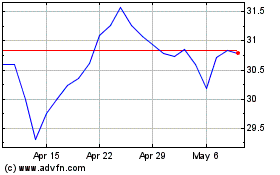UPDATE: US Safety Board Urges Changes After Connecticut Plant Blast
June 28 2010 - 2:04PM
Dow Jones News
A federal agency is proposing a ban on the use of natural gas to
clean industrial piping following an investigation of a fatal blast
earlier this year at a power plant under construction in
Connecticut.
The U.S. Chemical Safety Board issued 18 urgent recommendations
Monday calling for federal safety regulators, trade organizations
and turbine manufacturers to end the practice of blowing gas
through pipes to clean them of debris. It also called for an end to
the purging of gas lines indoors.
The blast at the Kleen Energy Systems LLC plant in Middletown,
Conn., on Feb. 7 killed six workers and injured a dozen more. The
Chemical Safety Board recommendations also are driven by an
explosion at a ConAgra Foods Inc. (CAG) Slim Jim plant in Garner,
N.C., that killed four people and injured 67 in June 2009. In that
incident, gas wasn't being used for pipe cleaning, but was being
purged indoors.
The Connecticut explosion puts a spotlight on a common industry
practice that previously eluded the focus of regulators. The board
said other substances such as air, nitrogen or steam are economic
and widely available, and one of the largest turbine manufacturers
agrees, yet gas remains the most popular approach to clean debris
from pipes before a plant starts up. The issue is pressing, as an
estimated 125 new gas-fired power plants are scheduled for
completion in the next five years.
"I would submit to you that the present patchwork of inadequate
codes and voluntary practices does not protect America's workers
from the kind of explosions that killed six at Kleen Energy, killed
four at ConAgra, and threatened many others with death or injury,"
according to written testimony by John Bresland, a member of the
Chemical Safety Board, delivered at a congressional hearing
Monday.
The Chemical Safety Board, which investigates major industrial
accidents but doesn't have the authority to write regulations or
issue fines or citations, classified its recommendations as
"urgent" because of the imminent harm the use of gas to clean pipes
could pose. The recommendations were expected to be finalized at a
meeting of the board later Monday.
The recommendations come at a time of increased scrutiny of
energy industry safety practices following a spate of high-profile
deadly accidents in recent months. A series of investigations,
including a federal criminal probe, are underway to determine what
led to the explosion and sinking in late April of the Deepwater
Horizon drilling rig in the Gulf of Mexico, which killed 11 workers
and caused the biggest offshore oil spill in U.S. history. An April
explosion at a Massey Energy Co. (MEE) coal mine in West Virginia,
which killed 29 workers, also remains under investigation.
"These accidents have a common thread--all of them were caused
by methane or other flammable gasses, which were allowed to leak or
build up to dangerous levels," said U.S. Rep. Joe Courtney, a
Connecticut Democrat in a statement prepared for the same
hearing.
The Chemical Safety Board's investigation of the Connecticut
accident found workers on the day of the explosion were using
natural gas to clean piping at the near-completed plant. Gas from
the cleaning process was being vented into an area of the plant
that, though outdoors, was filled with plant equipment. In
addition, the venting pipe wasn't pointed straight up, but instead
was horizontal. The area contained the gas, which was ignited by
one of a variety of possible sources, from a spark caused by debris
being blown out of the piping to portable heaters running in the
area, according to the board.
The board investigation found a safety meeting on the
pipe-cleaning process wasn't held on the day of the explosion.
Also, at the construction site some workers were directed to leave
during the cleaning process, while others continued to work. A few
others, concerned by the smell of gas, left on their own accord,
according to the board's findings.
The board in its proposed recommendations calls on the U.S.
Occupational Safety and Health Administration, or OSHA, to write
new regulations prohibiting the release of flammable gas both into
the atmosphere and indoors for pipe cleaning. It also calls for
fuel gas codes to require the use of other substances for cleaning
and the inclusion of the recommended changes in technical guidance
issued by major turbine makers such as General Electric Co. (GE)
and Siemens AG (SI).
A spokesman for General Electric said the company "strongly
encourages" pipe cleaning methods that don't use gas, adding the
cost impact is minimal and the performance of a generation unit
isn't affected.
Bresland of the Chemical Safety Board called initial discussions
with OSHA encouraging. The agency declined to comment as it
completes its own investigation of the Connecticut explosion.
Courtney in his testimony took issue with the National Fire
Protection Association, which issues voluntary safety codes to
prevent explosions. He said the group declined to testify at the
hearing and recently rejected what the congressman described as
modest changes to its gas codes. A spokeswoman for the group didn't
immediately return a call seeking comment.
The blast in Connecticut last winter could be heard and felt for
miles from the construction site. The natural-gas-fired power plant
is owned by Energy Investors Funds, a Boston-based energy-focused
investment firm.
-By Mark Peters, Dow Jones Newswires; 212-416-2457;
mark.peters@dowjones.com
ConAgra Brands (NYSE:CAG)
Historical Stock Chart
From Jun 2024 to Jul 2024

ConAgra Brands (NYSE:CAG)
Historical Stock Chart
From Jul 2023 to Jul 2024
